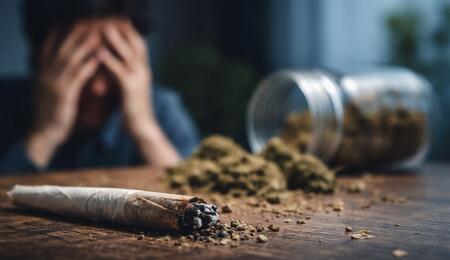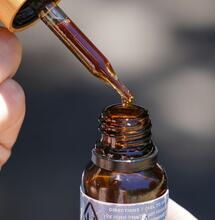Why Giving Up Cannabis After Years of Smoking Feels So Miserable?

If you’ve been an avid cannabis user for years, deciding to part ways with the herb—whether for a “T-break” or a permanent lifestyle change—is often met with an unexpected guest: absolute misery. What triggers those bad feelings, and how to deal with them? We discuss more below.
The internet is full of “day one” success stories, but for the long-term (heavy) smoker, the reality is usually a haze of night sweats, irritability, and a strange feeling that the world has lost its color. This isn’t just a lack of willpower; it is a complex biological recalibration. According to research, your brain is undergoing real neurobiological adaptation.
Let’s explore why the transition may feel so heavy and how to navigate the “gray zone” of cannabis withdrawal.
The Biological ‘Why’: It’s Not Just in Your Head
To understand the “misery,” you have to understand the Endocannabinoid System (ECS). Your body naturally produces molecules called endocannabinoids that keep your mood, sleep, and appetite in balance (homeostasis).
When you smoke cannabis daily for years, you are flooding your system with exogenous THC. To protect itself from overstimulation, your brain performs a defensive maneuver: it downregulates your CB1 receptors. Essentially, it “hides” the receptors or turns them off because it doesn’t need them to catch the natural flow of endocannabinoids anymore.
When you stop cold turkey, you are left with a “receptor deficit.” Your brain’s endocannabinoid signaling is insufficient with the few active receptors left, and it hasn’t had time to re-express and resensitize those receptors it hid. This state of chemical limbo is a major contributor to the misery.
The Timeline of the ‘Miserable’ Phase
As updated clinical guidelines on Cannabis Withdrawal Syndrome (CWS) describe, the experience generally follows a predictable, albeit difficult, arc:
- Days 1–3 (The Physical Peak): This is the “flu” phase. Quitters may experience cold sweats, nausea, and a complete loss of appetite. Your body is struggling to regulate its temperature without the influence of THC on the hypothalamus.
- Week 1–2 (The Irritability Spike): As physical symptoms fade, emotional volatility takes over. Without the “buffer” of cannabis, the nervous system is hypersensitive. Small inconveniences may feel like major crises.
- Week 3–4 (The Anhedonia Wall): This just might be the hardest part for long-term users. Anhedonia is the inability to feel pleasure. Because reward pathways involving dopamine are recalibrating, your favorite movies, foods, and hobbies might feel “flat” or boring.
Scientific Silver Lining: Research shows that CB1 receptors begin to recover within days, with receptor availability approaching baseline in many users after about four weeks. The intensity of withdrawal symptoms and their duration can vary widely between individuals. For most people, misery has an expiration date.
Navigating the REM Rebound
One of the most jarring parts of giving up cannabis after years of using is the return of vivid, often intense dreams. Cannabis is known to suppress REM (Rapid Eye Movement) sleep. When you quit, your brain experiences “REM Rebound,” trying to make up for lost dream time.
While these dreams can be exhausting or even scary, they are a sign of neurological recovery. Your brain is finally processing emotional and memory material that was previously suppressed.
Tips for How to Handle the ‘Transition’
Several things can help ease the “miserable” feeling for those who choose the path to quit or take a T-break from weed. The focus falls on supporting the ECS during its rebuild:
- Cardio Over Everything: Exercise produces anandamide, the body’s “bliss molecule” which acts as a natural version of THC. It can help “jumpstart” your receptors.
- Omega-3 Fatty Acids: Your receptors are made of fats. Supplementing with high-quality fish oil or hemp seeds may provide the raw materials your brain needs to help support ECS recovery.
- Hydration & Sauna: Sweating may help some people manage discomfort and stress, while keeping your electrolyte levels stable is key to reducing the “brain fog” associated with withdrawal.
Final Thoughts
Giving up cannabis after years of use is a significant physiological event. If you feel miserable, it is because your body is performing an incredible feat of recalibration. The “gray” period is temporary, and many biological markers normalize within about a month.
More from Soft Secrets:
Medical Disclaimer: This content is for informational purposes only and does not substitute for professional medical advice. If you feel extremely unwell during withdrawal, please consult a health provider or a mental health professional immediately.
















